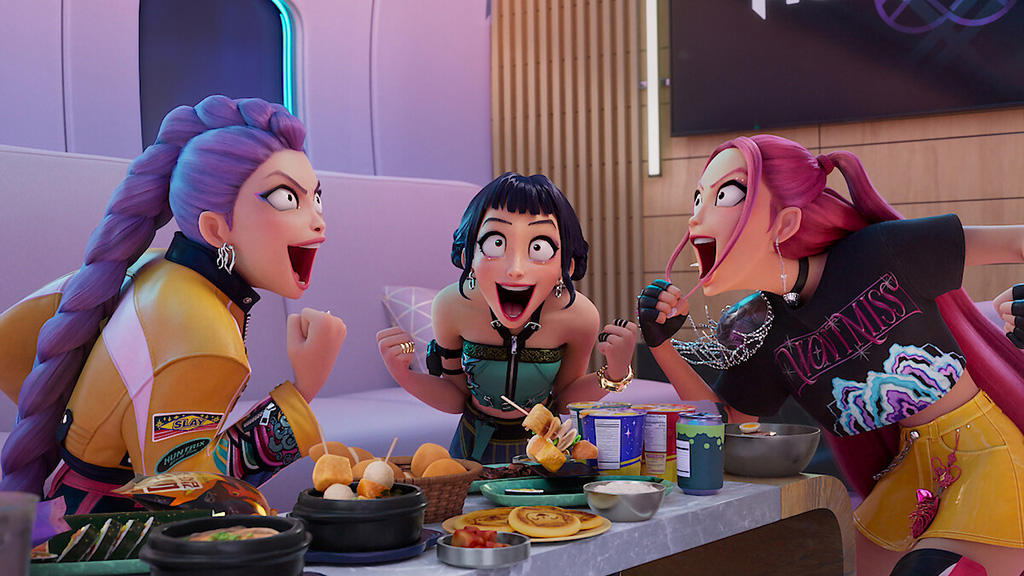One thing I like about K-Pop Demon Hunters is that there’s so much stuff in it that I hate.
I can’t imagine that there were a lot of discussions during the making of this movie where they were trying to figure out how best to make it appeal to childless white American men in their 50s1Even gay ones, but there was still a lot for me to latch onto, making me want to find out what all the buzz was about.
I’m a big fan of Buffy the Vampire Slayer, and a modern spin on fighting demons will never fail to interest me. I’m far too ignorant of Korean culture to know exactly what is informed by traditional art and mythology, and what was created for the movie, but the designs of the demons are awesome. And there are a magical tiger and three-eyed (six-eyed?) magpie with an awesome hat, that certainly feel like they’re referencing something far older.
Plus, Sony Animation has been absolutely killing it for several years now, cranking out movies that hit exactly the right balance between artistically masterful and distinctive, and solid, accessible storytelling.2Last night I saw a video that seemed to think it was making a novel observation comparing this movie to Frozen, and my reaction was, “Wow, you really blew the lid off of that one, huh?”
But no matter how much I’ve tried, I’ve never been able to get into anime or manga beyond the predictable, universally beloved entry points like Cowboy Bebop or Escaflowne. And beyond the “not my thing, but whatever” aspects, K-Pop Demon Hunters comes right out with a lot that’s on my “actively dislike” list:
- K-Pop boy bands
- So much autotuning
- Chibi style characters
- The super-exaggerated expressions so often used as shorthand in manga and anime where characters’ eyes bug out, their mouths get super-tiny, or they start crying profusely
So I was kind of primed for this one to throw me off, to hit the one false note that made it feel insincere and factory-generated, or the one flourish that made it feel as if it were just capitalizing on a popular style instead of being an authentic expression. And it just couldn’t lose me. It’s simply too fun, too charming, and its characters are too appealing that it feels near impossible not to enjoy it.
One of the recurring images that I like a lot is when the movie would cut to reactions from super-fans of the main band Huntrix. It would almost always include a tight-knit trio of aunties or grandmas, and a separate trio of young men freaking out over the band.
So much of the plot revolves around the band’s popularity, with the idea that their popularity is how they get their power, so I thought it was a cute gag to show how universally beloved they’d become. It wasn’t just the girls and young women you’d expect, but everybody loves Huntrix.
But as the story develops, the idea is shown to have a little more nuance: it’s not just the popularity that’s giving them power, but the genuine connection with their fans. This is made more and more explicit as the story goes on; the rival boy band that’s become popular not just because of their surface appeal, but because their music feeds and then feeds off of the audience’s negativity. Angering Huntrix into making a diss track that doesn’t feel right3Even though, significantly, it’s a banger, and later taking advantage of listeners’ insecurities, self-doubt, and self-loathing.
And we see reactions from the elderly women and the young men throughout, and it drives home that distinction between shallow fandom — “I like this because I’m supposed to” or “I like this because it’s in the category of stuff that’s made for me” — and genuine connection.
I’m a big fan of accessibility and approachability in art and entertainment, and I’m always banging the drum of art that meets people where they’re at. The obvious risk is that art that doesn’t challenge your preconceived notions, and doesn’t demand that you put real thought into analyzing what it’s saying or how it works, will leave you with no opportunity to grow or change or expand how you see the world and see yourself.
But as it turns out, there’s more than one way to challenge your own preconceived notions, and even a fairly simple and straightforward story can expand your horizons a little bit. Just by inviting you to engage with it, completely ignoring any silly questions like “is this even meant for me?”

Comments
2 responses to “One Thing I Like About K-Pop Demon Hunters”
Hazel said all of her class has seen KDH (actually 2 classes that regularly mix and combine with a total of 42 kids in 4th through 6th grade). She’s been singing the songs, writing down the lyrics so we can sing too and sketching different characters. It’s interesting to see fads come and go through schools. This is the first one I’ve seen that seems pretty nationwide. I wonder how popular it is in other countries. I love watching foreign films and shows on Netflix and I assume they are the biggest streamer worldwide in number of people and different countries.
If you need more YouTube video’s about this here are two I’ve enjoyed:
Mostly about the Korean words in the movie, but some about the mythical creatures: https://youtu.be/qCmpU3ssip8
A nice interview with the writer and co-director: https://youtu.be/KXBD2fU-ohg
Thanks Chris! I just found the first one the other day, and it was neat finding out that the tiger and magpie aren’t just from traditional art, but frequently show up in traditional art together.